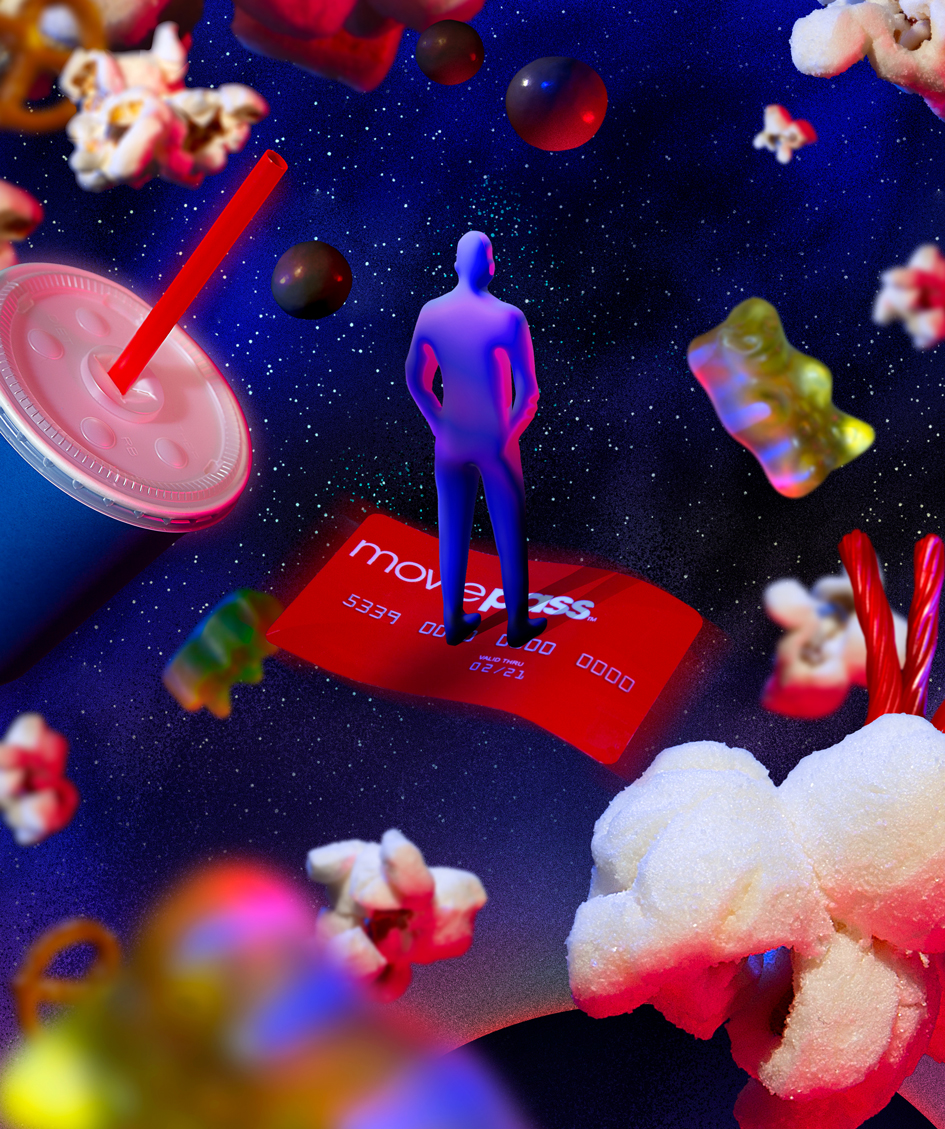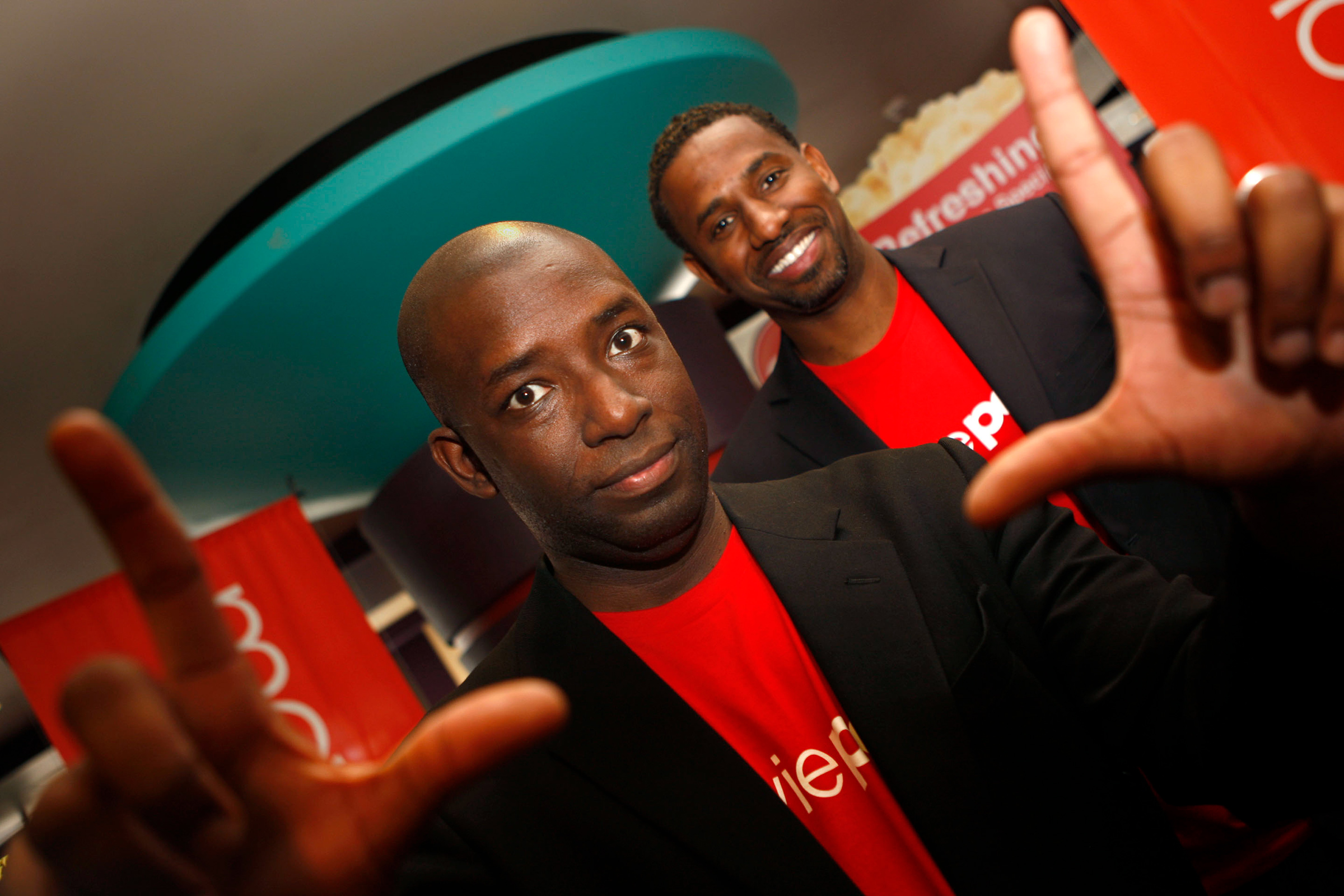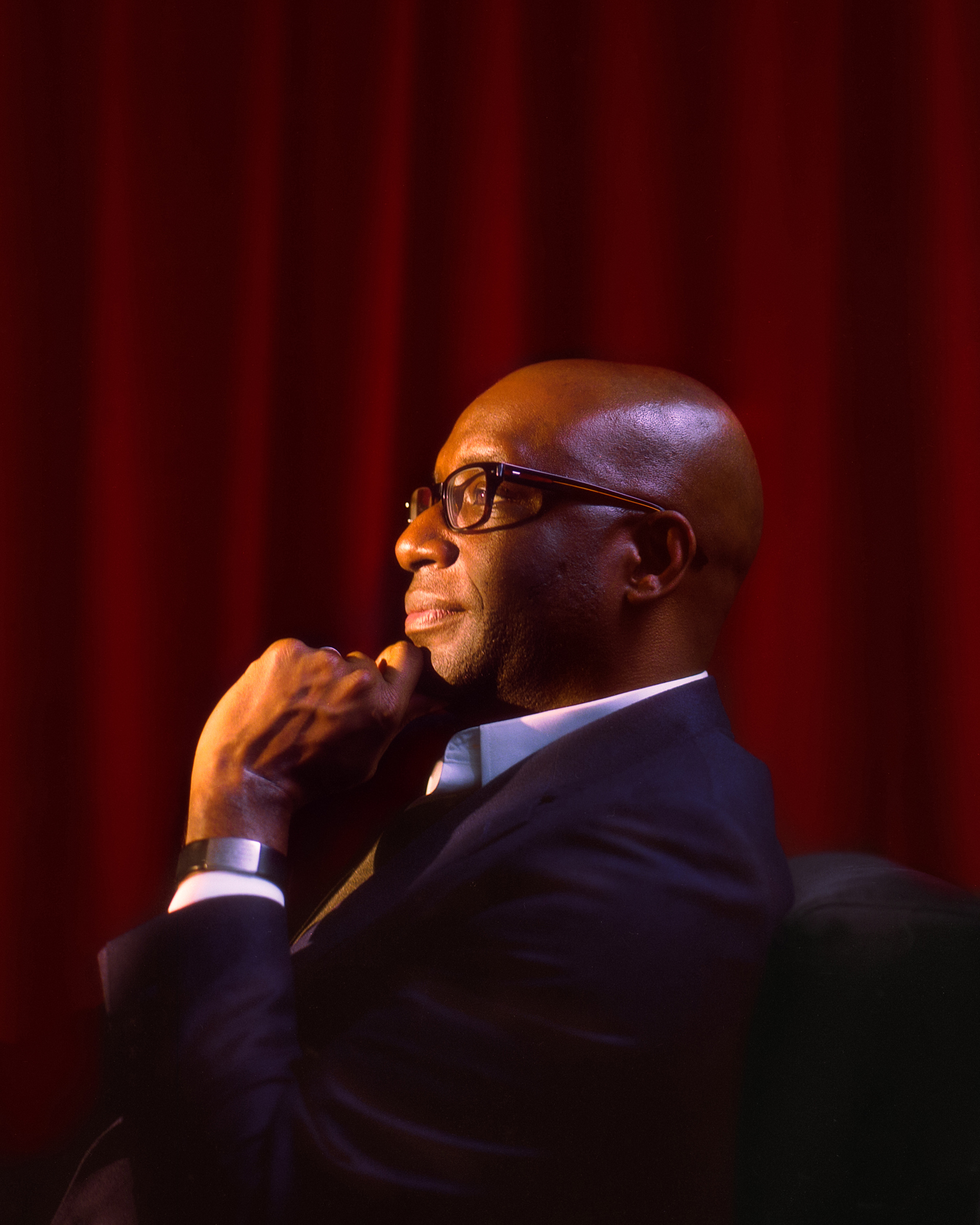
Any resemblance to Steve Jobs was unintentional, or so Stacy Spikes claims. Back in February, minutes before Spikes was set to take the stage at Lincoln Center in New York City to announce the resurrection of his old company, MoviePass, he realized he was sweating through his white button-up shirt and jacket. He changed into a more breathable black mock turtleneck, which, on his slim figure, paired with dark jeans, sneakers, and glasses, looked a lot like an homage to the Apple co-founder. “I didn’t want to be thinking, Are they going to see my sweaty pits?” Spikes, 54, says during an interview in a Manhattan office several weeks later. “When people said, ‘That’s very Steve Jobs,’ I was like, ‘Everybody in New York dresses in all black.’”
Spikes will invite the comparison again when his memoir, Black Founder: The Hidden Power of Being an Outsider, arrives in December. For the stark cover, he wore a nearly identical black shirt. Like Jobs, Spikes built a company from scratch only to be pushed out. Like Jobs, he watched from the sidelines as it fell apart. And like Jobs, he will attempt a triumphant return to the business he built.
But while Jobs was self-assured to the point of polarizing colleagues and occasionally the public, Spikes charms you into buying his vision of the future—specifically the future of moviegoing. He asks everyone he meets what films they’ve seen lately. He refuses to disparage a movie (to a journalist, anyway), even when I try to goad him into criticizing some of this year’s Oscar contenders. He’s eager to discuss why his friend might have missed the majesty of Dune’s sandy hills by watching the sci-fi epic at home rather than in an IMAX theater. “An adventure should never come with a pause button,” he says. He loves a dramatic metaphor: during his MoviePass 2.0 presentation, he included a slide of a phoenix rising from the ashes.
Read More: 10 Oscar-Nominated Movies and Performances You May Not Have Seen—But Should
Most people who are familiar with MoviePass—and it had more than 3 million members at its peak in the late 2010s—probably remember it as the company that offered cardholders the chance to see one movie per day at the theater of their choice for just $9.95 a month, and then predictably crashed and burned when the deal proved too good to be true. For Spikes, the story is more complicated—and more personal. It is one of struggling for years to secure funding, which he attributes at least in part to racial discrimination, and then being ignored when he disagreed with the business plan put forth by the company that bought a majority stake. He illustrated the implosion of MoviePass during his presentation with a picture of the Hindenburg.
Spikes is staging a comeback in a radically altered moviegoing environment. COVID-19 scared people away from theaters, and the proliferation of streaming services has kept them on their couches. The 2021 domestic box office, which includes the U.S. and Canada, trailed 2019’s by 60%. “We’re at the point where the industry is willing to try things,” says Daniel Loría, editorial director at Boxoffice Pro. “This is probably the perfect time for MoviePass to come back if it was ever going to come back at all.”
More from TIME
In its heyday, Spikes says, MoviePass increased any one user’s moviegoing somewhere between 100% and 144% by incentivizing customers to take risks on movies they wouldn’t otherwise see. Now Spikes believes he can boost attendance again. “We ask, Will anyone go to movies anymore? But we don’t ask that about other events,” he says. “We don’t ask, Is anyone going to go to basketball games anymore? Soccer games? Because you can watch those at home, but the live experience is different.”
Spikes is a magnetic pitchman, but it’s impossible to assess the feasibility of his plan. He is still trying to strike deals with theater chains and won’t even specify a date for the product’s release beyond that he’s targeting summer movie season. Perhaps most salient, while he says there will be a tiered pricing plan, he won’t say what those numbers actually are until launch day. He will say this: “It won’t be $10.”
Spikes often tells the story about how Blade Runner convinced him he wanted to pack his bags for Hollywood. When he was 14, he watched it in a theater wedged between his father, who fell asleep, and his inattentive brother. “I kept nudging my dad, who was just snoring, and my brother’s like this.” Spikes fidgets in his seat. “And I’m there thinking, How can I be a part of this world?” Spikes worked in a video store as a high schooler in Houston, left Texas for California with just $300 in his pocket, and got a job as a production manager at a production company at 19. He worked briefly on the business side of record companies before helping to market film soundtracks at Sony. By age 27, he was vice president of marketing at Miramax.

But it was films like Dumbo that set him on his career trajectory. “Do you know that Dumbo song with the crows?” he asks, before singing a few bars of that song, the one sung by a bird named Jim Crow. (Disney now runs a warning in front of the movie.) “As a kid, I guess it was supposed to be flattering that you were getting seen in something,” says Spikes. “But as I got older and worked in the movie business, I had this whole different view of what I saw in my childhood.”
In 1997, he founded the Urbanworld Film Festival, which featured the works of BIPOC filmmakers, including Ava DuVernay and Ryan Coogler before they were household names. “I was the Spike Lee of distribution because there was no one of color on that side of the fence,” he says. In 2004, the festival hosted the premiere of the thriller Collateral starring Jamie Foxx, Tom Cruise, and Jada Pinkett Smith. “I felt like I’d summited Everest, but I needed to find what was next.”
Read More: Hollywood So Often Gets Black History Wrong. Black Filmmakers Are Setting the Record Straight
In 2006, he designed a system that would allow moviegoers to sign up for a subscription and request tickets via text message. There were already subscription services at the movie theater chains in Europe, so Spikes was just introducing the concept to the U.S. “Everyone was like, ‘A subscription? That’s stupid,’” he says. “I was laughed out of conference rooms.”
Or worse. For years, he was unable to get funding for his venture. Black entrepreneurs received about 1% of venture-capital funding in 2011, the year he ultimately launched the company. (A decade later, that number has barely ticked up: Black founders received 1.2% of VC funding in the first half of 2021 when startups raised a record-breaking $147 billion.) “When you want access to higher capital, there’s a Black tax on you,” Spikes says. “It was like I had to run faster, climb higher than these guys who had multiple failed businesses. If you don’t look like Mark Zuckerberg, you don’t fit the mold. I saw a lot of people getting funding for worse business ideas, but they dropped out of Stanford, so they got a shot.”
Spikes used to bring an analyst named Geoff Kozma with him to pitch meetings to run the numbers in real time. “So Geoff and I walk into the meeting, and the guy walks over to Geoff, puts his hand out, and goes, ‘Stacy, it’s so nice to meet you,’ and Geoff goes, ‘That’s Stacy.’” Kozma was a young white man. “But even after that, at that meeting and a lot of other meetings, Geoff would be sitting there, and the VC guys’ attention would start drifting toward him. They’d start asking him questions instead of me. And I was like, Really?”
The rejections were particularly upsetting because, as his current and former co-workers attest, Spikes is obsessed with going to the movies. Ryan McManus, who started as an intern at the first iteration of MoviePass and is now head of product for MoviePass 2.0, has worked with Spikes on and off for nearly a decade. “I’ve saved every movie-ticket stub going back to 2003,” says McManus, “and he was even more passionate about movies than I was.”
In 2011, Spikes brought on Hamet Watt as a co-founder, and they were able to raise a combined $1 million from AOL and the venture-capital firm True Ventures. MoviePass launched that year, but five years after that, it still wasn’t profitable. Mitch Lowe, a former Redbox and Netflix executive, acted as an early MoviePass adviser, and found working with Spikes frustrating. But he felt they always had a connection, and agreed to come on board as CEO in 2016. “His main investor brought me in to essentially be his boss,” Lowe says. “That would be hard for anybody. He put his heart and soul into it. But he and I were great partners for that first year and a half, two years.”

Around that time the company had 20,000 subscribers who were being charged $34.95 to $49.95 per month, and it was still losing about $50,000 to $110,000 per month. Lowe, too, struggled to convince investors that MoviePass had juice. Looking back, he says Spikes may indeed have faced discrimination, but there was clearly a problem with the business proposition as well. “I met with 120 different investors and got no on 120,” Lowe says. “My wife is African American, so I see racism out there. I see the way people are treated. But I would not say that was the only reason. I wasn’t with Stacy in any of his investment meetings, but I can tell you I had 120 nos, and I’m a white guy.”
Then, in 2017, the data-analytics firm Helios and Matheson bought 51% of the company for $25 million. To increase subscribers, Helios and Matheson wanted to run a “promotion” dropping the price to $9.95 a month. Spikes, who had experimented with price points ranging from $19.99 to $49.99 over the years, was not wild about the idea. The average movie-ticket price in the U.S. was $8.97, so users would have access to near unlimited movies for just over the price of a single ticket. In the press, Lowe and Ted Farnsworth, CEO of Helios and Matheson, said they hoped MoviePass would work like a gym membership: plenty of people pay the monthly fee and never go, so the gym turns a profit. Here’s the problem: people don’t like running on a treadmill; they do like going to the movies.
Still, Spikes says he agreed to the promotion as long as they upped the price again after 100,000 new sign-ups. “It happened in literally 48 hours,” says Spikes. “I was like, ‘Great, turn it off.’ And they were like, ‘No, no, leave it on. See what happens. We know what we’re doing.’”
Spikes calculates they were losing $30 per customer per month. Lowe says it was closer to $17. Either way, they were losing money. “The math didn’t work,” says Spikes. In December 2017, the same month MoviePass reached its millionth subscriber, Spikes was removed from the board. The next month, he was informed he was no longer needed at the company.
A few days after he was ousted, Spikes went to the movies. “I walk up to the kiosk. And the person on my left pulls out a MoviePass card. The person on my right pulls out a MoviePass card. And they’re literally looking and smiling at each other. And you knew we were all part of something big,” he says. “And I’d created that. I never forgot that feeling.”
Read More: The 10 Best Movie Performances of 2021
By the first half of 2018, MoviePass members were buying 6.6% of all movie tickets in the U.S., according to Lowe. But that year, Helios and Matheson reported an estimated net loss of $329.2 million. In 2020, Helios and Matheson filed for Chapter 7 bankruptcy, and in 2021 the Federal Trade Commission filed a complaint alleging that the company had failed to secure customer data and had engaged in fraudulent practices like invalidating users’ passwords to try to prevent them from buying too many tickets. The resulting settlement prohibited the company from misrepresenting its practices and required it to put better security programs in place. But by then, MoviePass was long gone: it shuttered in September 2019. (Lowe said he could not comment on the FTC investigation because of a nondisclosure agreement, but blames the demise of MoviePass largely on user fraud—members sharing cards with one another and otherwise bypassing the system. Farnsworth did not respond to requests for comment.)
Spikes equates what he experienced with PTSD. “I was licking my wounds for about two months when my wife was like, ‘You need to put some clothes on and get out of the house.’” Then, late last year, he heard from someone working on a documentary about the rise and fall of MoviePass that nobody had bought the company assets during the bankruptcy auction. He called the trustee, who said the minimum bid was $250,000. Spikes talked him down to $140,000.
In September 2020, Spikes drove alone from his home in Manhattan to Hoboken, N.J., donned two masks, and sat in a theater with 10 other people to watch the action film Tenet. The next weekend he returned to see it again. “He’s my people, right?” Spikes says of director Christopher Nolan, who very publicly refused to debut his movie on a streaming service. “I told my wife, even if I have to get on a plane to fly to an open theater, I’m going to support this movie. And I’ve been at the movies pretty much every weekend since.”
He’s likely one of the few who can make that claim. Movie attendance plummeted during the pandemic: In 2019, 76% of people in the U.S. and Canada saw at least one movie in theaters. In 2021, that number dropped to 47%. People may have gotten used to streaming movies at home, especially since services like Disney+, HBO Max, and Peacock all launched right before or during the pandemic.
Every year, the Motion Picture Association releases data on the combined theatrical and home/mobile entertainment market. In 2019, it found that global digital spending (which includes purchases and rentals of movies from companies like Amazon and Apple) made up 48% of the market, theatrical sales made up 42%, and purchases of physical content like DVDs made up 10%. In 2021, digital spending made up 72% of the market, theatrical 21%, and physical content 7%. That digital spending calculation doesn’t even include the money customers pay for subscriptions to streaming services like Netflix.
The window between a theatrical release and a streaming release is also shrinking; would-be moviegoers often have to wait only a few weeks to stream a movie like The Batman. The Oscar-winning CODA was released simultaneously on streaming and in theaters, and studios occasionally skip the theater altogether. Spikes dismisses the threat of streaming and compares the situation to when DVDs went mainstream in the late ’90s. “We forget that we were worried people would stay home then too,” he says. But Rich Daughtridge, CEO of the upstart chain Warehouse Cinemas and president of the Independent Cinema Alliance, views the proliferation of streaming differently: “We see our main competition as the couch.”
Read More: The 10 Best Movies of 2021
Spikes often touts the loyalty of MoviePass customers. When he first founded the company, he was inspired by Steve Jobs’ biography to suggest that every employee—including himself—spend at least one day per month on the customer-service line. He recalls one not-so-happy customer who dropped her phone while running to the theater and demanded the company buy her a new $600 smartphone. “I was like, ‘But, ma’am, you dropped your phone,’” he says. “I think I gave her a free month.”
But more often the calls would turn into discussions about how much MoviePass members adored going to the movies. They hadn’t abandoned cinema because of Netflix. They’d abandoned it because movie tickets had gotten too expensive: movie attendance was already declining before the pandemic even as the box office ballooned, thanks to higher ticket prices. MoviePass’s relatively low (and later, absurdly low) price tag helped increase its customers’ attendance, until those fervent movie-goers quite literally loved MoviePass to death.
Persuading moviegoers to return to MoviePass may prove less challenging than wooing movie theaters. MoviePass buys tickets for its users directly from the theater. If it can buy discounted tickets, in exchange for promoting the theater on its app and incentivizing customers to go to the movies on slow-traffic days, the company can flourish. But if it has to pay full price for tickets, it will have to rely heavily on other revenue streams like advertising.
Spikes claims that the pandemic has made theaters much more open to MoviePass. “Before, the conversation was ‘Eh,’” says Spikes of his initial proposal in the 2010s. “Now the conversations are, ‘Congratulations on buying it. How soon can you be up?’ So COVID definitely did something it would have taken us years to do.”
My exchanges with theaters were more measured. The head of a small theater chain, who asked to remain anonymous because the company is still considering working with Spikes, said the customer-service issues that plagued MoviePass at the end of its first run “left a bad taste in our mouths.” The big chains—AMC, Regal, and Cinemark—declined to comment for this story. Loría of Boxoffice Pro says those chains likely see MoviePass as competition to their own loyalty programs, which were developed, at least to some degree, because of the success of MoviePass 1.0.
Spikes is undeterred. He says he’s had preliminary conversations with Cinemark and Regal, but AMC has not responded to his calls: “My feeling is at the beginning there may be some competitiveness, but if you still have empty seats, what do you care? Get bodies in there.”

Smaller chains and independent theaters—which make up about 20% of the industry, according to Daughtridge—seem more open to working with MoviePass. Alamo Drafthouse has 36 locations across the country and boasts comfy seats, meals instead of just concessions, and alcohol. The founders pride themselves on exhibiting smaller films that the bigger chains don’t show. In theory, their interest in saving the indie filmgoing experience should align with MoviePass’s mission. According to Lowe, in 2018, MoviePass was buying 30% of all movie tickets sold in the U.S. for smaller films (ones that grossed $20 million or less).
“We’ve been quite disruptive in the space,” says Michael Kustermann, the chief experience officer at Alamo. “So I think we were always curious about MoviePass. I think the $9.95 thing was a mistake. But like all good disrupters, there was probably a seed of a great idea that theaters should have been thinking of themselves.” Kustermann says Alamo, which has its own loyalty program, has not yet decided whether it will partner with MoviePass but has not ruled it out. “Instead of being dictatorial about how people get in the door, Alamo focuses more on the experience once they’re in the door.” After all, most theaters make their money on concession sales, and that’s especially true of chains that sell alcohol.
“I’m definitely intrigued,” says Daughtridge, of Warehouse Cinemas, which has two theaters in Maryland. He and Spikes have spoken several times about the potential of MoviePass 2.0. “We’re just running the numbers to make sure we don’t cannibalize our own sales.”
This summer will prove a crucial test for MoviePass’s viability, as a backlog of delayed blockbusters, like Top Gun: Maverick, Doctor Strange in the Multiverse of Madness, and Jurassic World Dominion, debut exclusively in movie theaters. “All the good content had been moved out. So it’s kind of like starving the patient and asking why they’re not gaining any weight,” Spikes says of the box office.
Optimistic prognosticators point to Spider-Man: No Way Home, which in December had the second biggest opening weekend in Hollywood history despite premiering during the Omicron surge, as a sign that audiences will come back. But even with that coup, the domestic box office totaled around $4.5 billion last year, compared with $11.4 billion in 2019.
About 10% of the estimated 5,500 movie theaters open pre-pandemic in the U.S. closed either temporarily or permanently, according to Comscore, and the theaters that are open today are mostly surviving on a few hits like Spider-Man and The Batman. Cinephiles fear a future in which studios make only superhero films for the big screen and relegate everything else to streaming. MoviePass doesn’t move the needle on the Marvel or Star Wars movies—people are going to come out for those anyway—but it may be able to have a substantial impact in driving ticket sales to indie films, Oscar bait, and documentaries.
If MoviePass can scale, then it could play a major role in saving the moviegoing experience. But with just months before launch, MoviePass won’t confirm whether Spikes has brokered any deals at all. MoviePass can exist without theater buy-in, but it’s unclear if it can thrive. To that end, Spikes will try to build a subscriber base quickly with several changes from its original incarnation, including tiered pricing options and in-app credits that customers can earn by watching ads. They will be able to apply these credits toward tickets for friends and family members who don’t subscribe to MoviePass, and, eventually, Spikes says, users will be able to trade credits among themselves via blockchain technology. Customers can also invest as stakeholders in the company.
During the MoviePass relaunch presentation, Spikes floated the idea of implementing technology that would track the user’s eyes during an ad and pause the ad if the user looked away or put the phone down. The demo immediately drew comparisons to dystopias like A Clockwork Orange. “I can say it’s given us some level of pause,” Spikes tells me when we meet. “If it’s something that we even decide to deploy, it might be radioactive. So it maybe doesn’t see the light of day.” A month later, he says he’s decided it will not be a part of the app launch this summer, though he may consider integrating it later.
It’s clear that Spikes cares deeply about the future of cinema, but he’s also desperate to give the MoviePass story a happy ending. “I sometimes worry if I build something new, someone will take it away from me again,” he admits. Yet he forged ahead with the relaunch. “I knew I could build something again. Because you can’t take my intelligence. You can’t take away my passion.”
Read More: People Longing for Movie Theaters During the 1918 Flu Pandemic Feels Very Familiar in 2021
If MoviePass succeeds, Spikes will be vindicated. Lowe and others who pushed him out will be cast as the obstacles he had to overcome to make his comeback. I ask Lowe how he feels about his role in that potential narrative. “I’d be so happy for his success in this,” he says. “It wouldn’t bother me at all for people to say that he told me so.”
With reporting by Mariah Espada
More Must-Reads from TIME
- Cybersecurity Experts Are Sounding the Alarm on DOGE
- Meet the 2025 Women of the Year
- The Harsh Truth About Disability Inclusion
- Why Do More Young Adults Have Cancer?
- Colman Domingo Leads With Radical Love
- How to Get Better at Doing Things Alone
- Michelle Zauner Stares Down the Darkness
Write to Eliana Dockterman at eliana.dockterman@time.com